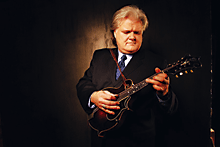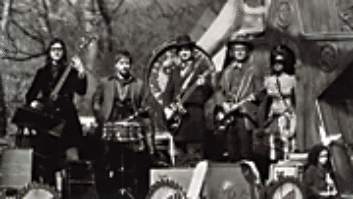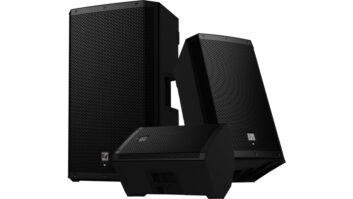
Not everyone can be Jimmy Bowen or Tony Brown, but not everyone needs to be. The record business offers more definitions of success than radio has music genres. The trick is to find that place where you’re doing what you love, you’re true to yourself, you’re challenged every day, but you’re still making a living.
Label president/virtuoso Ricky Skaggs
Take Ricky Skaggs. About 15 years ago, he realized that the generation of “young country” artists who were coming up had little to do with his style of playing. He asked himself whether it made any sense for him to carry on as if nothing in country music had changed since he’d started scoring hit songs and taking home Grammys in the early 1980s.
“In 1996, Mr. Monroe passed away,” Skaggs explains, “and I looked at my place in country music at that time — what was going on in the fabric of country music on the radio and at the labels. I felt like for me to compete, I would have to change my sound to be more pop. Instead, I decided that I could serve the music community better, if I went back to the music I grew up playing — bluegrass — because that was the foundation of everything I’d been doing.”
So Skaggs did what we all do in lean times: He scaled back. He started using a smaller touring band, which meant fewer transport vehicles and a smaller crew, and he told his agent to start booking him at bluegrass festivals instead of country dates. “We were making the same money playing these bluegrass festivals that we had been playing country music shows, but I had six or eight fewer people on the road and we only needed one bus instead of two. It was a smart thing to downsize and simplify my life — but when we went to these bluegrass festivals, we didn’t have a product to sell to fans. That’s when the guys and I went into the studio, and on my dollar recorded an album called Bluegrass Rules so we would have something to sell on the road.”
Skaggs was still signed to Atlantic at the time, but Atlantic passed on Bluegrass Rules. So Skaggs made a deal for Rounder (distributed by MCA/Universal) to release the album with the imprint Skaggs Family Records (www.skaggsfamilyrecords.com). “We sold over 200,000 copies — an independent record on an independent label,” Skaggs says. “So we said, ‘Well, gosh, let’s do another record.’”
And so Skaggs Family Records was born; it’s now wholly owned by Skaggs and his wife and label mate, Sharon White, of bluegrass gospel group The Whites.
Meanwhile, around the same time, future Compass Records (www.compassrecords.com) president Garry West was on the road playing bass for Michele Shocked. Also on the tour was West’s then-girlfriend, the talented banjoist Alison Brown. “While we were on the road, touring in Europe, we talked about what we wanted to do,” West recalls. “We knew we didn’t want to just ride someone else’s bus forever. We wanted to have creative input into the whole process.”
West says that he and Brown “literally drew this thing on a paper restaurant napkin that we called ‘The Good Life,’ and that meant, in terms of our creative goals, a studio and a publishing company, as well as the performance and recording part of being musicians ourselves.”
West and Brown weren’t household names with multiple Grammys and Number One country hits on their resumés like Skaggs had when he went into the label business, but they did make a very able team. West had already been moving in the direction of production when he got the call from Shocked; he’d been producing local blues and R&B bands in the hopes of licensing the recordings to European labels whose demand was good for those American genres. “And fortunately for me, Alison is the most overeducated banjo player in the world,” he says. “She has a Harvard degree and an MBA from UCLA. In fact, she’d worked for an investment bank for a couple of years before she left all of that to play banjo with Alison Krauss. We realized we really complimented each other, and we still do.”
West and Brown’s Compass Records became a home for roots and world-music artists of all sorts, whether they’re into bluegrass, Americana, rock ‘n’ roll, blues, jazz, Celtic or a fusion of styles.
IT’S A STUDIO AND A LABEL
Compass Records’ early releases included Kate Campbell’s first four releases and four from bassist Victor Wooten. “Victor’s first album was a complete solo bass record,” West says. “No performances by anyone else. Other people were skeptical, but we believed it could succeed. Victor is a remarkable artist and he needed to be represented and considered as accessible, marketable and as meaningful as anything else. That was, and is, the passion we brought to it.”
Several years and 200 releases later, Compass moved into its current home just off Music Row. “We bought the former Glaser brothers’ publishing company building and studio,” West says. “My understanding is they built the studio with the publishing money from ‘Gentle on My Mind.’ Waylon Jennings was a partner in that company and he had an office here and made some songs that ended up on Wanted! The Outlaws here; he made his first Gold record here.”
Chuck Glaser’s former office is now the room where West conducts Compass Records’ business. It’s on the same floor as the studio, a 1,800-square-foot space that includes a tracking room with iso booth, piano/keyboard room with two additional isos and a Pro Tools HD-based control room. “We have a nice complement of outboard and mics — nothing too extravagant, but everything’s serviceable,” West says modestly. “We have a great, really clean, short signal path, too; stuff just works.”
“The studio has a really natural, open, acoustic sound that I love and works really well for acoustic music,” says engineer Erick Jaskowiak, who has been Compass Studio’s staff engineer for 4 years. “One of the best things about it is a lot of wood in the construction of the room. Before I worked for Compass, I was on staff at Sound Emporium, and I remember that T Bone Burnett once said about Sound Emporium’s A room that it was like recording inside the hollow body of an acoustic guitar. I feel like this room is a version of that, as well.”
Skaggs Family Records also found its home in a building with an illustrious past. The company purchased a complex that includes the Oak Ridge Boys’ former studio, as well as label offices. Skaggs’ go-to engineer, Brent King, says the control room and gear have been updated since Skaggs acquired the place, but the tracking room is largely unchanged. “It has some nice, old, wormy cypress wood and hardwood floors,” King says. “It’s just a nice, natural-sounding room. I told Ricky that if you ever update this place, the trick is going to be not to screw anything up.”
The studio also provides another revenue stream. It’s a commercially available facility offering Pro Tools, 48 tracks of RADAR (Skaggs’ preferred digital platform) and Skaggs’ impressive collection of mics and outboard. “I’m like a kid in a candy store with his gear,” King says.
Both King and Jaskowiak are sold on the benefits of working in a small-label-owned studio. King says, “You’re working for the boss, and it’s a great home base for him. He always knows what he’s going to get, and he’s very familiar with his preamps and EQs, and his own mic collection.”
“It allows me to know my equipment intimately,” Jaskowiak says, “so that no matter what genre we record, I can do it better. If I’m after a certain sound, I’m able to achieve that. It also helps that I really like the styles of music that Compass works on. These are real artists trying to tell their story.”
One of the tricks for any small business owner is keeping the size of the company in balance with adequate personal attention and control — and knowing when to stop before management becomes micromanagement.
“When we had some other groups on the label, I was trying to produce everything,” Skaggs recalls, “and it was killing me. And I’m not sure they were getting everything they wanted. Blue Highway was one of the groups, and I loved working with those guys; they were so talented. But I think that sometimes I can be a good friend and a mentor, but do artists really want to be working in the studio with me making all the decisions? I had to weigh those things. I realized that maybe I just thought that they were expecting me to do all that stuff. Now I’ve backed down a bit from producing because I’ve got more on my plate now than I can honestly say grace over, so it’s better for other bands to let me executive-produce from a distance.”
Compass’ catalog now includes upward of 250 releases, and West has acquired rights and/or assets to a handful of Celtic labels, including Green Linnet.
“We never had a real vision of how big we ought to be,” West says. “We just, out of passion and desire, stepped off in this direction of, ‘Let’s do it right and see where it goes,’ which sounds a lot less strategic than business schools would suggest that you be, but that’s the way it worked for us.
“One thing we’ve learned over time is that thinking you need to micromanage every aspect of a business through its growth is a misconception,” West continues. “If a company is small enough to micromanage, it’s not big enough to serve the needs of everyone involved, whether you’ve got 10 or 30 artists. A record company has to be large enough and have enough momentum and scope to get the proper attention for its artists and reach the level of efficiency where the tentacles of the company can reach to all the different places they need to. The best way to do this is to hire good people who fit the culture of your company — who hopefully know their jobs, whether it’s marketing or sales or publicity, better than the owner does.”
Both West and Skaggs have been on both sides of the desk when it comes to label/artist relations. So each of these small-label owners approaches the business side with an understanding of what’s reasonable to expect from artists — hard work, promotion and touring — and how an artist they sign should reasonably expect to be treated.
“We’re looking for musicians who understand it’s a team effort,” West says. “You can always achieve more with a great team. And if they have a question, they can ask it without fear that someone is going to control them from an artistic standpoint. And accountability is a key element for us because we’re musicians ourselves.”
“What makes Skaggs Family Records successful,” observes King, “is Ricky’s credibility and character. I think people all over this business know that his word is his bond.”
“I’m a Christian, and we do Christian business,” Skaggs says simply. “I’m honest, we pay our bills. I would rather pay somebody $1,000 too much than cheat them $10. And if we make a mistake, we don’t look at it as a mistake; we look at it as a life lesson and a learning experience, and we don’t get mad or down about it. We get up about it and learn from it and go on. We’re that kind of people.”
Barbara Schultz is a Mix assistant editor.







